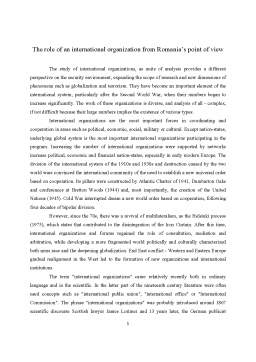Extras din proiect
The study of international organizations, as units of analysis provides a different perspective on the security environment, expanding the scope of research and new dimensions of phenomena such as globalization and terrorism. They have become an important element of the international system, particularly after the Second World War, when their numbers began to increase significantly. The work of these organizations is diverse, and analysis of all - complex, if not difficult because their large numbers implies the existence of various types.
International organizations are the most important forces in coordinating and cooperation in areas such as political, economic, social, military or cultural. Except nation-states, underlying global system is the most important international organizations participating in the program. Increasing the number of international organizations were supported by networks increase political, economic and financial nation-states, especially in early modern Europe. The division of the international system of the 1910s and 1930s and destruction caused by the two world wars convinced the international community of the need to establish a new universal order based on cooperation. Its pillars were constructed by Atlantic Charter of 1941, Dumbarton Oaks and conferences at Bretton Woods (1944) and, most importantly, the creation of the United Nations (1945). Cold War interrupted dream a new world order based on cooperation, following four decades of bipolar division.
However, since the 70s, there was a revival of multilateralism, as the Helsinki process (1975), which states that contributed to the disintegration of the Iron Curtain. After this time, international organizations and forums regained the role of consultation, mediation and arbitration, while developing a more fragmented world politically and culturally characterized both arms race and the deepening globalization. End East conflict - Western and Eastern Europe gradual realignment in the West led to the formation of new organizations and international institutions.
The term "international organizations" came relatively recently both in ordinary language and in the scientific. In the latter part of the nineteenth century literature were often used concepts such as "international public union", "international office" or "International Commission". The phrase "international organizations" was probably introduced around 1867 scientific discourse Scottish lawyer James Lorimer and 13 years later, the German publicist Constantin Frantz said that federalism is the principle of existence of international organizations. Consecration final term is due to the work of Walter Schücking ' organizations of the world ", published in 1908, and the guide "public international unions" by Paul S. Reinsch, 1911.
League of Nations Convention, signed in 1924, recognizes the existence of international organizations in Art.23 indirectly suggesting the creation of specialized international organizations, to promote international cooperation. Furthermore, Article 24 uses concepts such as "international office" or "international commission" to existing organizations at the time, thus highlighting, voluntarily or not, the importance of creating new international organization. Both articles define the universal vocation of the League of Nations organization. Later, after the Second World War, in the Preamble of the Charter of the United Nations recognized the existence of an international organization itself: the signatories "thus establish an international organization called the United Nations".
From this conceptual crystallization period, were developed three current main defining role of international organizations as instruments, as arenas and, finally, as actors. Often, international organizations are seen as instruments by which states pursue their own interests and decision making reflects primarily the interests of the most powerful members. As arena, international organizations are similar to a "playground" and not an instrument of state policy, and that institutions are forms of diplomacy conference where countries can exchange information, can condemn or justify certain actions and their can coordinate national political strategies. Unlike the previous two approaches, the third stop on Member States as the main actors, but believes that states have delegated their sovereignty so that international organization acquires the characteristics of a collective actor, decisions are made under or by the international organizations, by a community member.
Bibliografie
1. RITTBERGER, Volker şi BERNHARD Zangl, International Organizations. Polity, Politics and Policies, Palgrave Macmillan, Hampshire, 2006
2. The Covenant of the League of Nations, 1924, http://www.yale.edu/lawweb/avalon/ leagcov.htm#art23
3. The Charter of the United Nations, 1945, http://www.un.org/aboutun/charter
4. http://www.law.columbia.edu/library/Research_Guides/internat_law
5. http://www.un-documents.net/esc/res/arch1950/288.html
6. IRIYE, Akira, Global Community. The Role of International Organizations in the Making of the Contemporary World, Regents of the University of California, USA, 2002
7. JACOBSON, Harold, apud IRIYE, Akira, op. cit., 2002
8. SALAMAN, Lester M. şi Helmut K. ANHEIER, apud IRIYE, Akira, op. cit., 2002
Preview document
Conținut arhivă zip
- The Role of An International Organization from Romania's Point of View.docx















